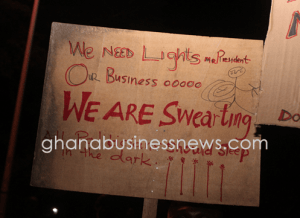Would dumsor end in 2016?
 Ghana has been grappling with energy crises for sometime now. Most of the time parts of the country are plunged into darkness.
Ghana has been grappling with energy crises for sometime now. Most of the time parts of the country are plunged into darkness.
The situation, which has become known as dumsor – dumsor is a combination of two Akan words ‘Dum’, switch off and ‘Sor’ switch on has cost human lives, negatively affected businesses and forced some to lay off workers.
But the Minister of Power calls it ‘load shedding’.
According to the Ghana Social Development Outlook (GSDO) 2014 of the Institute of Statistical, Social and Economic Research (ISSER) of the University of Ghana dumsor is costing the country about $1 million a year.
In its 2014 “State of the Ghanaian Economy Report” ISSER found that the government of Ghana has only been able to achieve a mere 0.1 per cent of its targeted 10 per cent increment in energy from 2010 to 2020.
“Two thirds of rail have been dormant for 12 years and would require reconstruction, national freshwater resources are under siege from mining activities, and recycling and composting have not been given attention,” it said.
The government had hoped to increase power generation from 2,300 to 5,000 megawatts by 2017.
The government, seemingly overwhelmed by the situation has consistently displayed gross inability to address the problem squarely. Appeared dazed by the situation, it seems to have fallen prey to marauding predators – most of them quasi-energy companies and middlemen parading the corridors of power and haranguing the government with proposals of energy deals that clearly are overpriced and often not the right solutions to dumsor.
Pressured by public complaints and demands to end dumsor, government officials including the president have only done what politicians do best – talk. They have been making promises, sometimes with specific timelines to end the darkness, but each time the deadline approaches, they would find some stories to tell and shift the goal post.
In it efforts at doing something to end dumsor, the government doesn’t seem to get it quite right. The government ordered an emergency power plant the Karpower barge from Turkey, which is costing the country some hundred million dollars. The Ghana National Petroleum Corporation had to post a guarantee of $100 million for the barge.
Then enter, the controversial AMERI Energy power plant. The plant was said to cost different prices at different points. Some $411 million has been mentioned. It is also estimated to cost Ghana $590 million under a build, own, operate and transfer deal, and yet some have argued that it could have cost Ghana some $220 million for outright purchase.
The Minister of Power, Dr Kwabena Donkor in the wake of the controversy over the AMERI deal, issued a statement part of which contradicted some sections of the agreement that the Ghana government has signed with the company. On the issue of civil works for instance, the Minister said AMERI would bear the cost. But the government eventually did, paying the contractor E&P about GH¢25 million but in the Ministry of Finance’s Annual Report, the amount paid for civil works was a little over GH¢15 million.
During this Christmas holidays some citizens were in darkness. Most Ghanaians are exasperated, and some can only vent out on radio and on social media.
But the question still remains, despite all the assurances by the Power Minister and the president, as 2015 ends and 2016 beckons, would dumsor follow Ghanaians into the New Year?
By Emmanuel K. Dogbevi
Email: [email protected]
